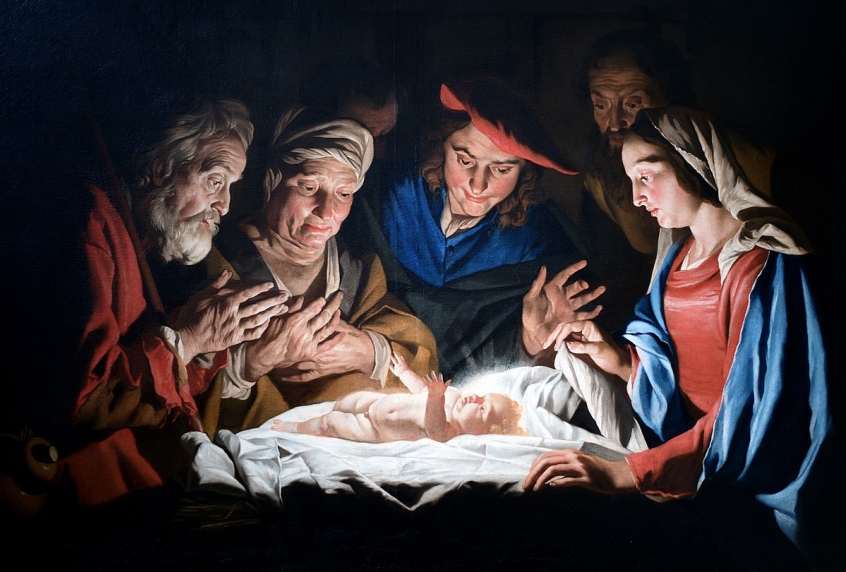Every year at Christmas we read that passage from Isaiah 9 that begins, 'There will be no more gloom for those who were in distress... in the future he will honour Galilee of the Gentiles' – and so on. We do tend to miss out the first word of the chapter, which is 'Nevertheless' – in other words, everything that follows has a context.
What's gone before is a picture of muddle and confusion, fear, politics, war, destruction and hunger. We skip all that and go straight to the nice bit.

In fact this sublime chapter, with all its promises of a better world, of peace and harmony, is rooted in messy and painful human experience. It's part of a section in Isaiah that begins in chapter 7 and deals with an existential threat to Judah. At this time there were two Hebrew kingdoms. Under Solomon's son Rehoboam Israel had split in two; the northern half was Israel, the southern half was the tiny state of Judah, which remained loyal to David's dynasty and where the old capital of Jerusalem was. Syria and Israel had attacked Jerusalem and failed to conquer it; Ahaz, king of Judah, was understandably terrified. Isaiah was the court prophet. His job was to stiffen the king's spine and offer him worldly advice, like any good courtier; but it was also to get him to lift up his eyes from his present trials and tribulations so that he could see what God was doing.
Chapters 7-9 of Isaiah are the extraordinary record of those anxious times and of what was said in the court and council of the king. Isaiah tells Ahaz not to worry; the threatened conquest won't happen. Instead, one of the two great super-powers of the ancient world, Assyria, will invade Syria and Israel and lay them waste. He says, 'The wealth of Damascus and the plunder of Samaria – Israel's capital – will be carried off by the king of Assyria.' And he warns Ahaz that his job is to remain loyal to God: 'If you do not stand firm in your faith, you will not stand at all' (7:9). There's a ring to that!
He warns of dark times ahead for Judah as well, and historically this is what happened – Assyria obliterated the northern kingdoms and left Judah as a sort of vassal state, impoverished and subservient (7:17). Isaiah makes his own statement of faith, his own testimony: 'I will wait for the Lord, who is hiding his face from the house of Jacob. I will put my trust in him' (8:17).
But it's not just politics. Interwoven with these fragments of history there's something else. Isaiah can dimly see, in the history of God's dealings with Israel, hints of something far greater and far more significant. It's like shafts of light breaking through the clouds on a stormy day. So in chapter 7, Isaiah says that God will give Ahaz a sign that Syria and Israel will be defeated. Verse 14 says: 'Behold, a virgin shall conceive and bear a son, and shall call his name Emmanuel, God with us.'
Because Matthew uses those words in his story of the birth of Jesus, our minds leap straight to that. For Isaiah's hearers, that wasn't the point. And they didn't hear him say, 'A virgin shall conceive', either; a better translation is 'a young woman' – and certainly not 'the virgin', as the NIV has it; that's reading back into the text something you think ought to be there. Because this is a prophecy for King Ahaz. It goes on, 'Before the boy knows enough to reject the wrong and choose the right, the land of the two kings you dread – Israel and Syria – will be laid waste' (7:16). In other words, stick it out for a couple of years and Israel and Syria won't be a problem any more. The young woman in question may have been Isaiah's wife; we don't know. What we do know is that it happened just as he said: first Syria fell, then Israel.
There's nothing miraculous about that, it's just statecraft. But these are also shafts of light lancing down from the far future. Matthew in his Gospel describes Joseph, discovering that his fiancée Mary is pregnant and having a vision in which he's told, 'What is conceived in her is from the Holy Spirit.' Matthew says: 'All this took place to fulfil what the Lord had said through the prophet: "A virgin shall be with child and will give birth to a son, and they will call him Immanuel which means, God with us' (Matthew 1:22).
So the act of rescue that God performs for his people in about 740 BC, and the sign that he gave to his people that he would do that, become a promise to the world that God would do that for everyone. Immanuel wasn't the only child born with a name that said something about God – Isaiah had two other sons and gave them both symbolic names – but Mary's child would be utterly, completely different. The Immanuel born in 740 BC would live and die, and the only thing significant about him was his name: but the Immanuel born to Mary would be the saviour of the world.
So we start in the muddle and mess of ancient Middle Eastern politics, and we end in a different place entirely. The same thing happens with chapter 9 and the tremendous vision of a future in which the people walking in darkness have seen a great light, the rod of the oppressor is broken and every warrior's boot used in battle and every garment rolled in blood will be fuel for the fire, because to us a child is born.
Again, it starts with advice to Ahaz. There are the enemies to the north, Israel and Syria. There's a hostile superpower to the east, Assyria. There's another to the south, Egypt. And Ahaz is surrounded by panicky people, each of them with a different word of advice, including fortune-tellers and pagan priests, people who thought you could summon the dead and tell the future by consulting the entrails of goats. And Isaiah said: 'When men tell you to consult mediums and spiritists, who whisper and mutter, should not a people enquire of their God? Why consult the dead on behalf of the living? To the law and to the testimony!'
And it's then that this great chapter 9 begins, with its 'Nevertheless'. Suddenly it becomes not just the vision of an immediate future in which one tiny country's political independence is secure for a few more years; it becomes huge. It's the vision of a future where everything is right; where there is shalom for everyone. And one person will hold it all together: 'For to us a child is born; to us a son is given; and the government will be on his shoulders.'
Why 'on his shoulders'? Because government is a weight; it's a load to carry. We can see this at the moment very clearly, where national and international problems seem overwhelmingly complex.
Isaiah's talking about the affairs of a tiny Middle Eastern country, and he's trying to give its king a bit of backbone. At the same time there's this vision of glory, where he sees God stepping in and making things new, and giving hope to the hopeless, helping human beings flourish in body, mind and spirit, bringing shalom.
When Jesus goes to Nazareth and reads the scroll in the synagogue in Luke 4, the passage is: 'The Spirit of the Lord is on me, because he has anointed me to proclaim good news to the poor. He has sent me to proclaim freedom for the prisoners and recovery of sight for the blind, to set the oppressed free, to proclaim the year of the Lord's favour.'
And he is quoting from Isaiah.
What Isaiah dimly saw all those years ago comes true in Jesus. He is Immanuel, God with us, and he calls us to make that new world real.
Follow Mark Woods on Twitter: @RevMarkWoods













